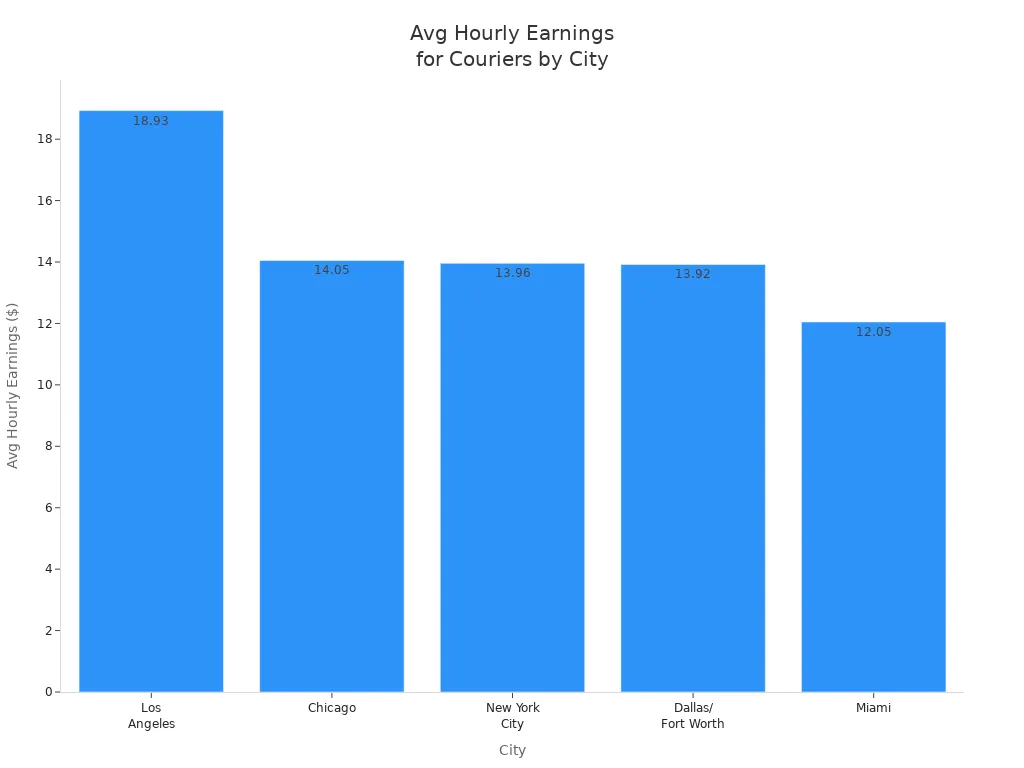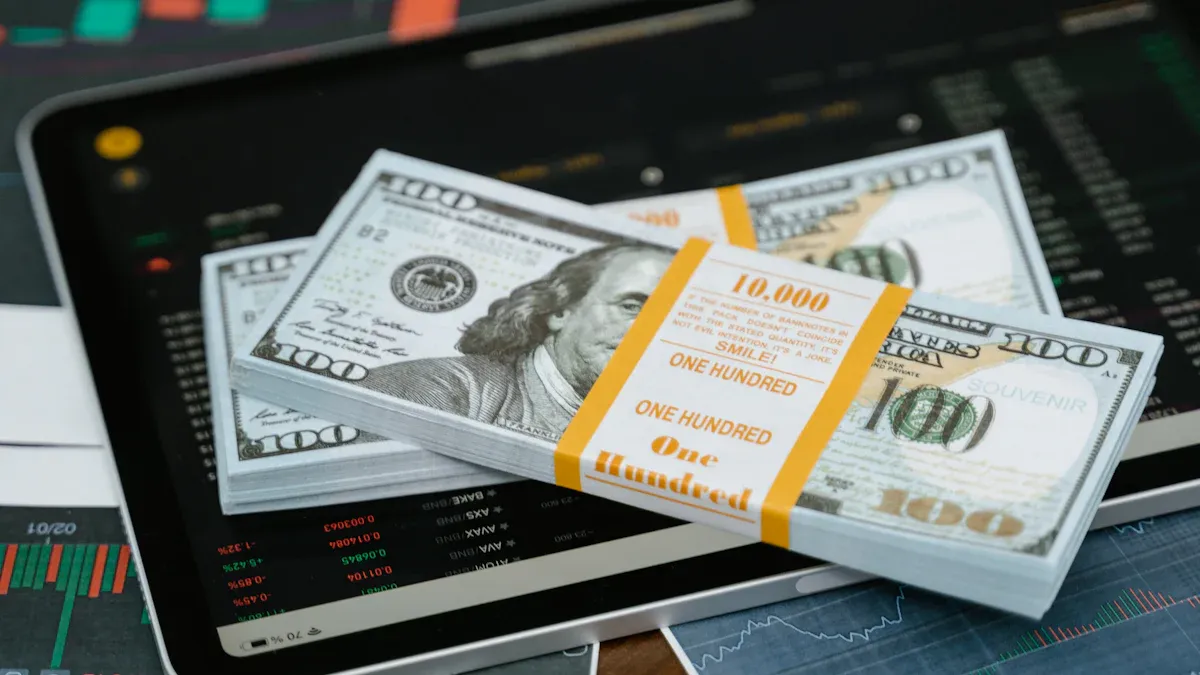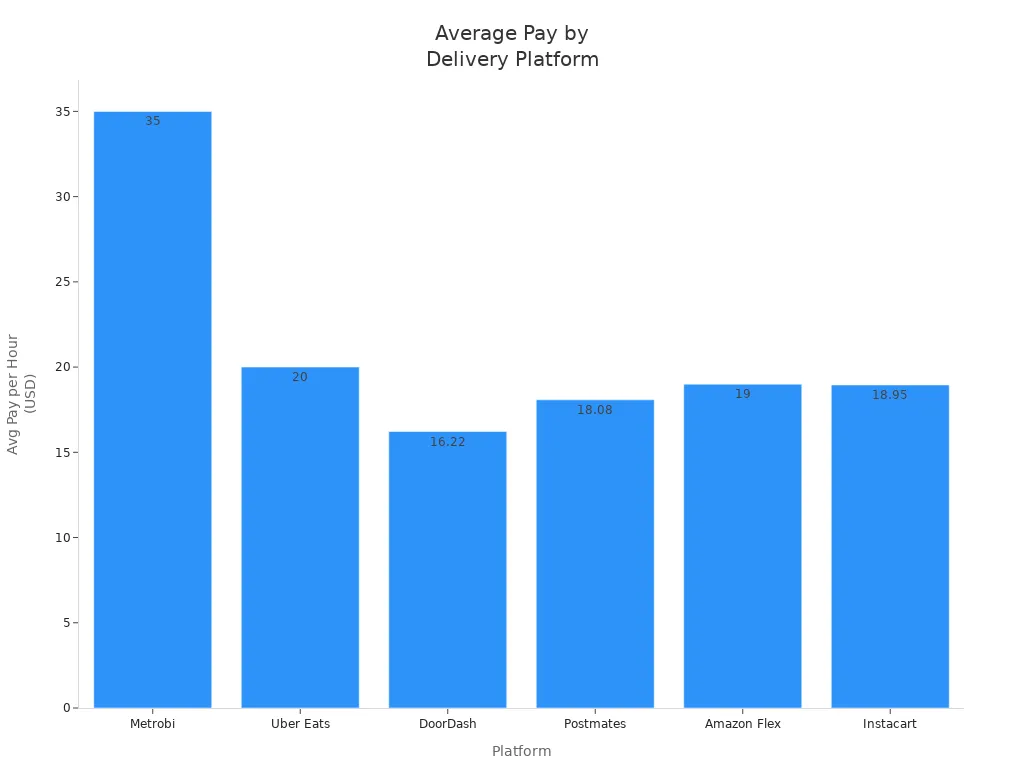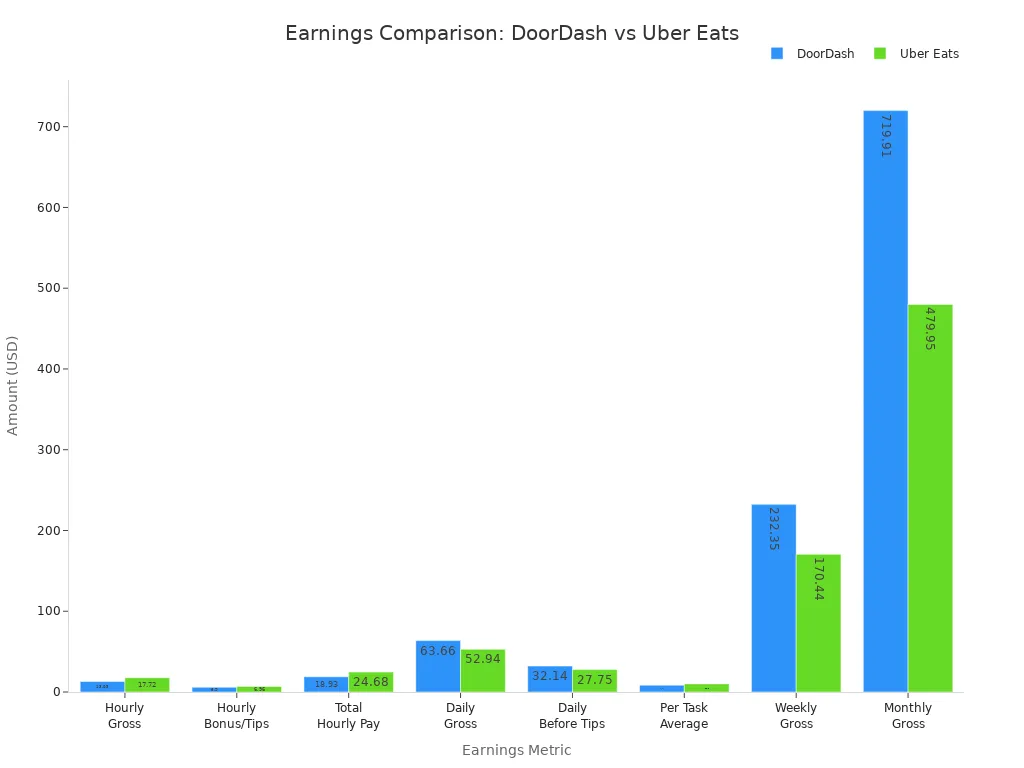Courier or Food Delivery Rider: Who Earns More?

If you want to know which job usually pays more, you might be surprised. Couriers tend to earn higher hourly wages than a Food Delivery Rider in most cities. For example, in Los Angeles, couriers make about $18.93 per hour, while delivery riders often earn less. Check out the average hourly earnings in major cities:
City | Average Hourly Earnings |
|---|---|
Los Angeles | $18.93 |
Chicago | $14.05 |
New York City | $13.96 |
Dallas/Fort Worth | $13.92 |
Miami | $12.05 |

You will notice that pay changes a lot depending on your location, the company you choose, and the type of delivery you do. Think about what matters most to you before you decide which path to take.
Key Takeaways
Couriers generally earn more than food delivery riders, with hourly wages ranging from $15 to $45, depending on location and delivery type.
Location and demand significantly impact earnings; urban areas typically offer higher pay due to increased demand for deliveries.
Food delivery riders can boost their income by working during peak hours and maximizing tips, which can account for a large portion of their earnings.
Consider your priorities when choosing between courier and food delivery jobs, such as flexibility, pay structure, and job security.
Both roles require physical stamina and awareness of safety risks; taking care of your health and using safety gear is essential.
Pay Comparison

Courier Pay
When you look at courier jobs, you will see a wide range of pay. Most couriers earn between $15 and $45 per hour, depending on where you work and what you deliver. According to recent data, the average annual salary for couriers is $46,311. This is lower than the national average salary, which sits at $67,727. Take a look at the table below for a quick comparison:
Source | Average Annual Salary | National Average Salary Difference |
|---|---|---|
Salary Finder | $46,311 | -$21,416 |
Some courier jobs pay much more than others. For example, medical couriers often get higher rates, especially for rush orders or late-night deliveries. You might see extra charges like $15 for after-hours or $20 for late-night runs. If you have to wait at a pick-up spot, you can earn a waiting fee. Deliveries that need to be fast or go a long distance also pay more. Here’s a breakdown of what can boost your pay as a courier:
Service Type | Rate Description |
|---|---|
Medical Courier | Higher rates for rush orders and after-hours delivery |
Additional Charges | $15 surcharge for after-hours, $20 for late night |
Waiting Charge | Per-hour charge for waiting at pick-up locations |
Delivery Speed Impact | Higher costs for time-sensitive deliveries |
Distance Charge | $1.50 per mile for car, $2.00 for larger vehicles |
Tip: If you want to earn more as a courier, look for jobs that need special handling or fast delivery. Medical and private courier gigs often pay the best.
Your pay as a courier also depends on other things. Where you live matters a lot. Urban areas usually pay more because there is more demand and the cost of living is higher. The type of goods you deliver can also make a big difference. High-value or special items often mean higher pay. If you work during busy times or take longer routes, you can earn even more.
Food Delivery Rider Pay
If you work as a Food Delivery Rider, your pay can also vary a lot. Most riders earn between $8 and $35 per hour. The platform you choose makes a big difference. Some companies pay much more than others. Here’s a table showing the average hourly pay for some of the top food delivery platforms:
Platform | Average Pay per Hour |
|---|---|
Metrobi | $35 |
Uber Eats | $20 |
DoorDash | $16.22 |
Postmates | $18.08 |
GrubHub | $15 - $28 |
Amazon Flex | $19 |
Instacart | $18.95 |

You might notice that Metrobi stands out with the highest average pay. Uber Eats and DoorDash are also popular choices, but their pay can change based on your city and how many orders you complete. Some riders make more by working during busy meal times or in areas with lots of restaurants.
Let’s compare how much you can make with DoorDash and Uber Eats. The table below shows the average hourly pay, including bonuses and tips:
Metric | DoorDash | Uber Eats |
|---|---|---|
Hourly Gross | $13.03 | $17.72 |
Hourly Bonus/Tips | $5.90 | $6.96 |
Total Hourly Pay | $18.93 | $24.68 |

As a Food Delivery Rider, you can boost your earnings by working during peak hours, like lunch and dinner. Some platforms also offer bonuses for completing a certain number of deliveries in a set time.
What Impacts Your Pay?
Many things can change how much you earn, whether you are a courier or a Food Delivery Rider. Here are some of the biggest factors:
Location: Cities with more people and higher demand usually pay more.
Type of goods: Delivering special or high-value items can mean higher pay.
Demand: Busy times, like weekends or holidays, often bring in more money.
Work hours: Working late or during rush hours can boost your earnings.
Delivery distance: Longer trips usually pay more.
Experience: If you have more experience, you might get better rates.
Vehicle type: Using a car instead of a bike can sometimes mean higher pay.
Note: Your pay can change from week to week. Try different platforms and times to see what works best for you.
Payment Structure
Hourly vs. Per Delivery
When you start working as a courier or Food Delivery Rider, you will notice two main ways to get paid. Some companies pay you by the hour, while others pay you for each delivery you complete. Here’s a quick look at how these pay structures work:
Pay Structure | Description |
|---|---|
Hourly Wages | You get steady pay, usually between $12 and $20 per hour. Some companies add extra pay during busy times. |
Per-Delivery Pay | Your earnings depend on how many deliveries you finish. You might make more money if you work fast, but your income can change from day to day. |
Hourly pay gives you a sense of security. You know what you will earn for each hour you work. Per-delivery pay can be exciting because you have the chance to earn more if you complete lots of orders, especially during busy hours. However, it can also feel risky since slow days mean less money.
Bonuses and Incentives
You can boost your earnings with bonuses and special rewards. Many companies offer extra pay or perks to keep you motivated. Here are some common incentives you might see:
Earn rewards for making deliveries, getting high customer ratings, or working during peak hours.
Redeem points for fuel discounts, exclusive gear, or even e-bike rentals.
Receive bonuses for on-time or fast deliveries.
Hit targets, like a set number of deliveries, to unlock cash bonuses.
Enjoy rewards for great customer feedback.
Some companies offer “Employee of the Month” perks, team outings, or extra days off.
You might also see special programs like the Dasher Rewards Program, where you earn points for each delivery and for keeping customers happy. These points can turn into real savings or cool equipment.
Companies use different types of bonuses to help you earn more. For example:
Incentive Type | Description |
|---|---|
Boost | Multiplies your base pay in busy areas |
Quest | Gives you bonuses for completing many deliveries |
Surge | Raises pay during high-demand times |
During peak hours, you can earn much more because of surge pricing and extra promotions. Sometimes, you might get a bonus that adds 10% to 50% more to your base pay for each order. If you plan your schedule around these busy times, you can really increase your total earnings.
Flexibility
Scheduling Options
When you look for a job as a courier or food delivery rider, you probably want to know how much control you have over your schedule. Some companies give you a set timetable, while others let you choose when to work. You might prefer one style over the other, depending on your lifestyle.
Here’s a quick table showing how top companies handle scheduling:
Company | Scheduling Options | Best For |
|---|---|---|
UPS | Scheduled deliveries with tracking and insurance | High-volume businesses and strict delivery timelines |
FedEx | Same day and scheduled delivery | Urgent, reliable document and freight services |
Uber | On-demand and scheduled deliveries with tracking | E-commerce and small businesses needing flexible delivery |
Instacart | Flexible schedule for independent contractors | Individuals seeking control over their work hours |
If you work for UPS or FedEx, you follow a set schedule. You know your hours ahead of time, which helps if you like routine. Uber and Instacart offer more freedom. You can pick up jobs when you want. Instacart even lets you work as a Full-Service Shopper, so you decide when and how much you work. If you become an In-Store Shopper, the store sets your hours, usually up to 29 hours a week.
Tip: If you want to fit work around school, family, or another job, flexible scheduling can make your life easier.
Impact on Earnings
Your schedule can change how much you earn. If you work for a company with set hours, you get steady pay. You know what to expect each week. If you choose flexible gigs, you control your hours, but your income might go up and down.
You can work more during busy times, like weekends or holidays, to boost your earnings.
If too many riders or couriers are working, you might wait longer for jobs. This can lower your pay.
Some people like the freedom of self-employment. You pick your hours and decide how much you work.
Others want stable income. If demand drops, you might earn less with flexible jobs.
You need to think about what matters most to you. Do you want steady pay or more freedom? Flexible jobs let you chase higher earnings, but they also come with risk. If you plan your schedule well, you can make the most of busy times and earn more.
Tips and Extra Income
Food Delivery Rider Tips
You can boost your income as a Food Delivery Rider by making the most of tips. Many customers like to show their appreciation with extra cash. Here are some things you should know:
Most food delivery riders get tips on a regular basis.
The average tip is usually between 15% and 20% of the total order cost.
About 63% of people who use meal delivery services always tip their driver.
Tips can make a big difference in your total pay. In some cities, apps suggest higher tip amounts, which helps you earn more. On platforms like DoorDash, your base pay might be as low as $2 or $3 per delivery, so tips are a huge part of your earnings. You get to keep 100% of the tips you receive, which means every dollar goes straight to you.
If you want to get better tips, try being friendly, deliver food quickly, and keep orders safe and warm. A smile and a simple thank you can go a long way!
Some apps, like Grubhub, often suggest a default tip when customers order. This can lead to better tips compared to other services. If you work during busy meal times or in areas with generous tippers, you might see your earnings grow even faster.
Courier Tips
Couriers can also earn extra money from tips, but it happens less often than with food delivery. Customers sometimes tip for fast service or for handling special items with care. Here are a few ways you can increase your chances of getting tips:
Offer great customer service and be polite.
Handle packages carefully, especially if they are fragile or important.
Communicate clearly if there are any delays or issues.
Some courier jobs, like medical or private deliveries, may bring in higher tips, especially if you go above and beyond. While tips are not always expected, they can add a nice bonus to your regular pay.
Remember, every little bit helps. Even small tips can add up over time and make your job more rewarding.
Work Environment

Physical Demands
You might think riding around all day sounds easy, but both courier and food delivery jobs can be tough on your body. You spend hours sitting or moving in ways that can strain your muscles. If you ride a motorcycle or bike, you often hold the same position for a long time. This can lead to pain in your arms, shoulders, and back. Many riders report aches and pains, especially after busy days with lots of deliveries.
Here are some common physical challenges you could face:
You may develop musculoskeletal problems from repetitive movements and awkward postures.
Pain in your upper body often comes from riding motorcycles or bikes with poor posture.
The more deliveries you make each day, the more likely you are to feel tired or get sick, especially if you rely on this job to support your family.
Tip: Stretch before and after your shift. Take short breaks when you can. These small steps help reduce pain and keep you moving.
If you work as a courier or food delivery rider, you need to pay attention to your health. Listen to your body and rest when you feel sore. Staying active and using good posture can make a big difference.
Weather and Safety
Weather plays a huge role in your daily work. You spend most of your time outdoors, so you face all kinds of conditions. Rain, heat, and cold can make your job much harder. If you ride a bike or motorcycle, you deal with even more risks from traffic and slippery roads.
Here are some safety and weather risks you should know about:
Couriers and riders face more road accidents and slip-and-fall incidents because they work outside.
Long shifts can make you tired, which increases your chance of accidents.
Food delivery riders often work during the hottest part of the day, so heat exposure is a big problem.
Wet weather makes roads slippery, and rushing to deliver food can lead to crashes.
Bikes and motorcycles are smaller and less visible, so you need to watch out for cars and trucks.
Extreme weather, like heavy rain or heat waves, means more orders but also more risk for you.
Note: Always wear safety gear, like helmets and reflective jackets. Drink water often, especially on hot days. If the weather gets bad, slow down and stay alert.
Your safety matters. If you pay attention to the weather and take care of yourself, you can handle the challenges and stay safe on the road.
Job Satisfaction
Work-Life Balance
When you work as a courier or Food Delivery Rider, your job can affect your personal life. Some people love the freedom these jobs offer, while others struggle to find balance. You might want to know how other drivers feel about their work-life balance. Here’s what drivers have reported:
38% of drivers said they felt only slight satisfaction with their work-life balance.
47% of DHL drivers felt unhappy with their work-life balance.
61% of drivers said they had a good work-life balance.
You can see that experiences vary a lot. Some drivers enjoy flexible hours and time off when they need it. Others feel stressed because of long shifts or unpredictable schedules. If you want more control over your time, gig jobs can help. If you need steady hours, you might feel frustrated.
Many drivers also mention reasons for feeling unhappy at work. Take a look at some of the most common reasons:
Reason for Job Dissatisfaction | Description |
|---|---|
Worry about losing your job can make you feel stressed. | |
Financial Stress | Not knowing how much you will earn each week can cause anxiety. |
Constant monitoring can make you feel like you have no privacy. | |
Loss of Work Autonomy | You might feel like you have little control over your work. |
Many drivers feel they do not earn enough. | |
Lack of Occupational Health Insurance | Not having health coverage is a big concern. |
Unskilled Nature of the Job | Some people feel the job does not use their skills. |
Algorithmic Management | Apps and algorithms can make you feel watched all the time. |
Physical Demands of the Job | The work can be tiring and hard on your body. |
There are few chances to move up in your career. | |
Laborious Nature of the Job | The job can be physically tough. |
Poor Career Prospects | Some drivers feel stuck with no way to grow. |
If you want to enjoy your job, think about what matters most to you. Flexibility, steady pay, and health benefits all play a role in your happiness.
Customer Interaction
You meet many people as a courier or Food Delivery Rider. Some days, you might have friendly chats with customers. Other days, you just drop off a package or meal and go. Good customer interactions can make your day better. A simple thank you or a smile can lift your mood.
Sometimes, you may face rude or impatient customers. This can feel tough, especially if you are tired or busy. Most drivers say that positive feedback and tips help them feel appreciated. If you enjoy meeting new people and helping others, you might find this part of the job rewarding.
Remember, your attitude can make a big difference. Being polite and helpful often leads to better tips and happier days.
Choosing the Right Job
Matching Priorities
You have a lot to think about when picking between a courier job and a food delivery rider job. Your personal priorities matter most. Some people want more money, while others care about freedom or job security. Here are some things you should consider before you decide:
Flexibility: Do you want to set your own hours or stick to a fixed schedule?
Upfront costs: Will you need to pay for a car, bike, fuel, or insurance?
Physical demands: Are you comfortable with lifting heavy packages or riding for long hours?
Payment structure: Do you prefer steady pay or earning per delivery?
Job security: Are you looking for a stable job with regular hours?
Salary: How much do you want or need to earn?
Benefits: Do you need health insurance or a retirement plan?
Career growth: Are you interested in moving up to roles like route manager or logistics coordinator?
Many workers value flexibility and independence. You might enjoy having no boss watching over you. Some people even say they care more about enjoying their work and having control over their schedule than about making the most money. If you like working alone and managing your own time, these jobs can be a good fit.
Tip: Think about what matters most to you—money, freedom, or job security. Your answer will help you choose the right path.
Pros and Cons
Let’s break down the main pros and cons of each job so you can see which one matches your needs best:
Role | Pros | Cons |
|---|---|---|
Food Delivery Rider | 🚴♂️ High demand during meal times | ⏳ Waiting for tips can lower income |
Courier/Specialized Delivery | 📦 More deliveries can mean more pay | 🚙 May need special vehicle or certification |
Courier jobs often come with better benefits, like health insurance and retirement plans. Companies like Amazon even offer paid time off and family care discounts. If you want to grow your career, courier work can lead to roles in logistics or management. Food delivery riders, especially those working as independent contractors, usually do not get these benefits.
Note: If you want steady pay and benefits, courier jobs might suit you better. If you want freedom and quick cash, food delivery could be the way to go.
You’ve seen that courier jobs usually pay more than food delivery roles, but the right choice depends on what you want from work. Many drivers leave these jobs each year because of pay and tough conditions. Think about what matters most—steady income, flexible hours, or job satisfaction. If you want to learn more, check out these resources:
US Bureau of Labor Statistics job outlook
Labor market reports on delivery driver trends
Worker forums for real-life experiences
FAQ
How much can you really earn as a courier or food delivery rider?
You can expect to make anywhere from $8 to $45 per hour. Your pay depends on your city, the company you work for, and how many deliveries you complete.
Do you need your own vehicle to start?
Most jobs want you to have your own car, bike, or scooter. Some companies offer rental options, but you usually pay for fuel and maintenance.
Tip: Check with each company before you apply. Some places have special deals for new drivers!
Can you work part-time or just weekends?
Absolutely! Many platforms let you choose your own hours. You can work after school, on weekends, or whenever you have free time.
Platform | Part-Time Option | Weekend Shifts |
|---|---|---|
Uber Eats | ✅ | ✅ |
DoorDash | ✅ | ✅ |
Instacart | ✅ | ✅ |
Do you get paid weekly or daily?
Most companies pay you weekly. Some apps offer instant cash-out, so you can get paid the same day you finish your shift.
Weekly pay: Standard for most jobs
Instant pay: Available on some apps for a small fee
See Also
Unlocking Logistics Savings: Essential Tips for Supply Chain Success
Understanding Logistics Risks: Key Trends You Should Know
Transportation Management Solutions: Affordable Options for Your Budget
Stop Overpaying: Effective Strategies to Reduce Supply Chain Costs
Mastering Logistics Savings: A Comprehensive Guide to Cutting Costs
